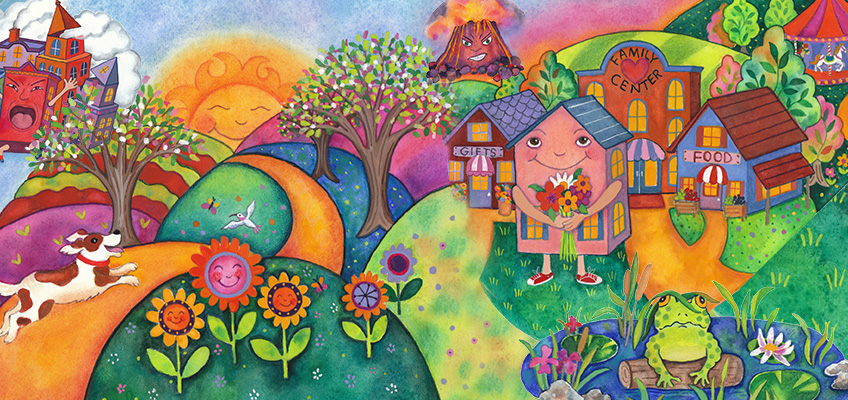
“Emotional development in children is crucial and yet severely disregarded,” says a well-known author, consultant and speaker who was greatly impressed by a new family board game from HeartMath.
“I was really blown away by the Wild Ride to the Heart,” Dr. Jim Taylor recently told the HeartMath Institute. Taylor is recognized worldwide for his work in the psychology of performance in business, parenting and sports.
“Is there anything more important than emotional development in children’s lives and futures? And, is there an area of child development so thoroughly neglected? As the author of two parenting books and a frequent speaker to parents, educators and young people, I argue for the need for deliberate and proactive emotional education for children. Yet, experiences that encourage emotional mastery are left mostly to trial and error.”
“Teaching children about emotions was the primary aim of Wild Ride,” said Jeff Goelitz, product developer and trainer for the nonprofit HeartMath Institute Education Division. “The hope, of course, was that there would be other benefits for children and families, and the early response has been very good, beyond what we were expecting,” said Goelitz, who designed the game with considerable assistance from his wife, Lena Goelitz of HMI’s sister company, HeartMath LLC.
“When a family plays the game together, we want it to be fun but also bonding,” he explained. “Given how busy everyone is, carving out a fun moment in which family members can share moments of fun and intimacy together inevitably will create more closeness. … Also, with all the different types of emotions woven throughout the game, hopefully all the players become more educated in emotional intelligence.
” In the Lindsay household, board games are big, and Wild Ride proved to be no exception, according to blogger Tree Lindsay of southern New Jersey, who designed and maintains the www.motherofpearlitis.net website. After a package arrived at her home and the contents were revealed to be the Wild Ride game, she recalled, “My 7-year-old Brianna said, ‘Ooh, we have this game at school.’
” Lindsay said, “Brianna, just loves it, but even our 15-year-old, Nikki, and our 12-year-old twins, Anthony and Andre, get in on the act and have a blast playing this game. They have even invited their friends over on several occasions to join in the fun.”
Lindsay said she appreciated that the game, which incorporates the HeartMath Institute ’s many years of emotion research and heart intelligence, was fun and educational, but added, “Wild Ride to the Heart not only does that, but also engages children emotionally and helps to establish a deeper family connection. Emotions are a tough thing for anyone to deal with, but for a child who doesn’t always understand, this game is a wonderful outlet for them. Learning new coping skills through play can help a child through such challenges as a divorce, overcoming frequent frustrations and temper tantrums, and simply giving them the ability to handle difficult situations in a more acceptable manner.”
Dr. Taylor said: “The Wild Ride of the Heart offers parents and educators a fantastic opportunity to teach children about emotions in a way that is both meaningful and fun. The Wild Ride gives kids the chance to learn about many different emotions, from anger and disappointment to love and calm. It also allows children to better understand emotions by learning to identify and express emotions. Importantly, the Wild Ride provides a powerful tool, Go to the Heart™†, that kids can use to help them to gain control of their emotions.”
The Taylor family has played the game many times, he said, including his young daughters who “get a kick out of making faces to match the cards and get the giggles when they Go to the Heart,” which players must reach, at the center of the board, to win the game.
Michelle Lash, a psychologist in Vermont, shared the following story about Wild Ride to the Heart:
“I am seeing an 8-year-old boy (Andrew) who was adopted by incredible people when he was 5,” Lash wrote recently to HMI. “Up to that point, he had been traumatized. When I saw him the first week, I gave him the Wild Ride to the Heart to test it out for me. I told him that if he played the game with his family at least seven times for 15 to 30 minutes and then gave me feedback on the game, I would give him one of the (HeartMath) Heart Bears. Last week he came in and told me he had not reached seven times yet, but he was playing the game with his parents and his grandmother. I was supposed to see him today, but there was a snowstorm. … His dad reported that he has been playing the game with them and it has been a wonderful opportunity to talk with him about emotions.”
Here’s what Andrew said about the Wild Ride: “The game was so fun. I loved it! It’s really good for your emotions. Love Lake is my favorite part of the game. I get to go over and hug and kiss my Dad and Mom. … One of my favorite emotions was getting excited when I picked up Love Lake for the first time, and then I felt love for my family.”
Lash noted a short time after this that Andrew’s father related that they had played the game at least the required seven times in the previous two weeks “and that their son did not get frustrated once, which is a huge issue for him when he plays games. ‘My son really loved the play-acting … He could get into the emotion and feel it, and he really felt proud about that. When there was sadness, he talked about what made him sad. Again, this is a big deal for him.’ “
Andrew’s father added, “It really was fun for all of us to play together, and we will continue to do so. There are going to be some rough times this year, and some losses coming up. I am grateful that we will have all been in the habit of playing this game.”
Goelitz said although kids appear to like the challenge of trying to win the game, “I also suspect that many of them know, through the game’s messages and experiences, that there are different attitudes to have in the face of winning or losing.”
He related his own story of playing Wild Ride with a mother and her 7-year-old son:
“The mother kept winning while the boy kept losing. Given his competitive nature, eventually the boy got upset. After he had his little tantrum, he knew afterwards that he needed to go to his heart, that in his words, he needed to be “heart smart.” He did finally manage to win a game, but I also sensed that he knew that his attitude needed to be upgraded,” which Goelitz called another form of victory.
“Parents like the game,” he explained, “because it addresses what are some of their concerns about raising children in this era. Life is fast, complicated and more stressful. Giving their children some common language and a tool to add to their repertoire of skills is very attractive.”
HeartMath cites the following benefits from the Wild Ride to the Heart game:
- Can be played at home or school.
- Helps children begin to identify and understand their emotions.
- Helps children in relationships with family and friends at home, school and play.
- Can aid in bringing family and friends closer.
“Life is fast, complicated and more stressful. Giving their children some common language and a tool to add to their repertoire of skills is very attractive.”Jeff Goelitz, chief developer of HeartMath’s Wild Ride to the Heart game.
You can learn more about HeartMath’s new family board game at Wild Ride to the Heart.
† The Go to the Heart™ tool is adapted from HeartMath’s HeartSmarts® and Early HeartSmarts® education and home programs for pre-kindergartners through fifth-graders.

